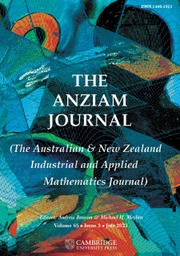No CrossRef data available.
Article contents
The commutation relation i[Y, Z] = 2Y and the absolutely continuous spectrum of Y
Published online by Cambridge University Press: 17 February 2009
Abstract
A relation between positive commutators and absolutely continuous spectrum is obtained. If i[Y, Z] = 2Y holds on a core for Z and if Y is positive then we have a system of imprimitivity for the group  on
on  , from which it follows that Y has no singular continuous spectrum.
, from which it follows that Y has no singular continuous spectrum.
- Type
- Research Article
- Information
- Copyright
- Copyright © Australian Mathematical Society 1982




